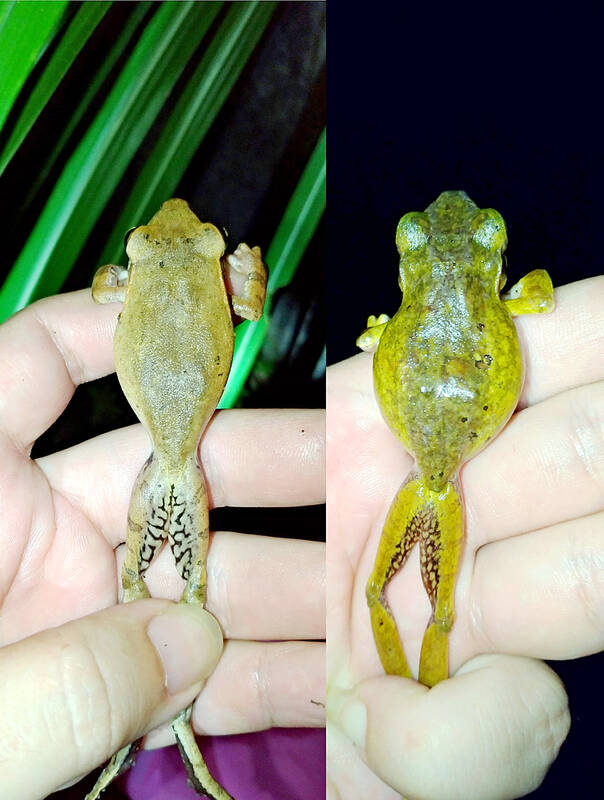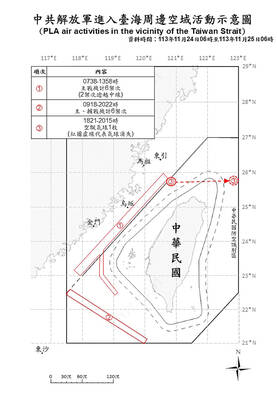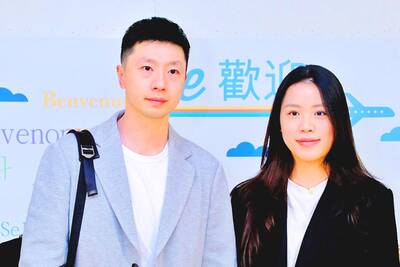Invasive Hong Kong whipping frogs are displacing Taiwan’s indigenous Polypedates braueri from their habitats, the Taiwan Forestry Research Institute said on Tuesday, citing internal studies.
Hong Kong whipping frogs, or Polypedates megacephalus, are one of the invasive anuran species introduced to Taiwan in the past two decades and are the most dangerous of the species to indigenous frog life, the institute said in a news release.
Other known invasive anuran species in Taiwan are American bullfrogs, banded bullfrogs, crab-eating frogs, cane toads and greenhouse frogs, with all but the first being recent additions, it added.

Photo courtesy of the Taiwan Forestry Research Institute via CNA
Researchers in 2015, 2019 and last year detected more calls from Hong Kong whipping frogs near New Taipei City’s Feitsui Reservoir (翡翠水庫), implying a decline of native frogs, it said.
The whipping frogs occupy a similar niche as the Polypedates braueri, but are capable of laying thousands of eggs at a time, resulting in numerous offspring that devoured available food sources in the environs, it said.
Citing a study by National Dong Hwa University associate professor of zoology Yang Yi-ju (楊懿如), the institute said the imported frogs have spread to every county-level jurisdiction in Taiwan proper except Taitung.
Taiwanese officials are treating the whipping frogs as an invasive species that must be subject to long-term management, it said.
The spread of invasive frogs into sensitive ecological zones is to be prevented by surveillance and culling of the imported species in conjunction with conservation efforts to boost the number of their indigenous counterparts, the institute said.
Meanwhile, owners of amphibian pets must be educated to understand that they cannot allow them to escape into the wild, it said.

Theaters and institutions in Taiwan have received 28 threatening e-mails, including bomb threats, since a documentary critical of China began being screened across the nation last month, the National Security Bureau said yesterday. The actions are part of China’s attempts to undermine Taiwan’s sovereignty, it said. State Organs (國有器官) documents allegations that Chinese government officials engage in organ harvesting and other illegal activities. From last month to Friday last week, 28 incidents have been reported of theaters or institutions receiving threats, including bomb and shooting threats, if they did not stop showing the documentary, the bureau said. Although the threats were not carried out,

‘GRAY ZONE’ TACTICS: China continues to build up its military capacity while regularly deploying jets and warships around Taiwan, with the latest balloon spotted on Sunday The US is drawing up contingency plans for military deployments in Japan and the Philippines in case of a Taiwan emergency, Japan’s Kyodo news agency reported. They would be incorporated in a first joint operation plan to be formulated in December, Kyodo reported late on Sunday, citing sources familiar with Japan-US relations. A US Marine Corps regiment that possesses High Mobility Artillery Rocket Systems — a light multiple rocket launcher — would be deployed along the Nansei Island chain stretching from Kyushu to Yonaguni near Taiwan, Kyodo said. According to US military guidelines for dispatching marines in small formations to several locations,

As Taiwan celebrated its baseball team’s victory in the World Baseball Softball Confederation’s Premier12 on Sunday, how politicians referred to the team in their congratulatory messages reflected the nation’s political divide. Taiwan, competing under the name Chinese Taipei (中華台北隊), made history with its first-ever Premier12 championship after beating Japan 4-0 at the Tokyo Dome. Right after the game, President William Lai (賴清德) congratulated the team via a post on his Facebook page. Besides the players, Lai also lauded the team’s coaching and medical staff, and the fans cheering for them in Tokyo or watching the live broadcast, saying that “every

The Mainland Affairs Council (MAC) yesterday confirmed that Chinese students visiting Taiwan at the invitation of the Ma Ying-jeou Foundation were almost all affiliated with the Chinese Communist Party (CCP). During yesterday’s meeting convened by the legislature’s Foreign Affairs and National Defense Committee, Democratic Progressive Party (DPP) Legislator Michelle Lin (林楚茵) asked whether the visit was a way to spread China’s so-called “united front” rhetoric, to which MAC Deputy Ministry Shen You-chung (沈有忠) responded with the CCP comment. The MAC noticed that the Chinese individuals visiting Taiwan, including those in sports, education, or religion, have had increasingly impressive backgrounds, demonstrating that the